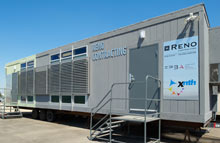Jul 9 2010
Reno Contracting, announced another first today with the LEED® certification of a Job Site Construction Trailer. This is the first and only structure of its kind to achieve such a rating. The trailer serves as the operations offices for the Reno on-site team, and is presently located on a jobsite in Anaheim.
The trailer has achieved certification under the U.S. Green Building Council's (USGBC) LEED for New Construction Version 2.2. LEED is the nation's preeminent program for the design, construction and operation of high performance green buildings. Reno achieved LEED certification for the trailer by following specific green design criteria and construction methods that positively impact the project itself and the broader community.
"We had planned on building a 'green' construction trailer for a while, as a logical extension of our growing portfolio of LEED certified and other energy efficient projects," explained Reno President Walt Fegley. "Together with the design teams of mechanical engineering firm Xnth, Ferguson Pape Baldwin Architects, and our subcontractors and vendors, we went to work to make it happen."
 Construction trailer
Construction trailer
LEED certification can be earned by a building that demonstrates it consumes less power and water, provides a healthier indoor environment, and produces less waste by lower consumption and recycling. Never before has a jobsite construction trailer received such a rating.
"Since the inception of LEED, it has always been important that the rating systems remain flexible and inclusive to varying types of buildings and facilities, knowing that reducing energy, water and natural resource consumption anywhere is going to contribute positively to the larger goal," said Rick Fedrizzi, president, CEO & founding chair, USGBC. "Reno has demonstrated environmental leadership in a new forum."
Material Reuse and Green Construction Materials
The frame and exterior walls of the Reno trailer were salvaged from an old trailer and reused as part of the new one. This kept the project from requiring new steel and wood framing. Likewise, many of the building products used in the trailer contain recycled or reclaimed materials. For example, carpet tiles were made from recycled rubber tires. Wall and ceiling insulation was composed of cotton from shredded denim jeans. Wall paneling was made from recycled HDPE piping products, and countertops were fabricated with crushed recycled glass.
Other considerations were given to indoor air quality, natural lighting and energy consumption. Adhesives used in the new casework and the paint applied to the trailer's accent walls have extremely low levels of volatile organic compounds. This insures that the air inside the trailer is always of the highest quality. Through the use of large storefront style windows and a reflective interior light shelf, trailer occupants will have high levels of direct and indirect natural light.
The HVAC and lighting systems have been designed to minimize the amount of energy that the trailer uses. This includes utilizing fluorescent lighting and lighting control sensors throughout the trailer, as well as windows that feature an operable function, which allows for outside air to easily circulate throughout the trailer, minimizing the need for the use of the mechanical AC unit.
Source: http://www.renocon.com/